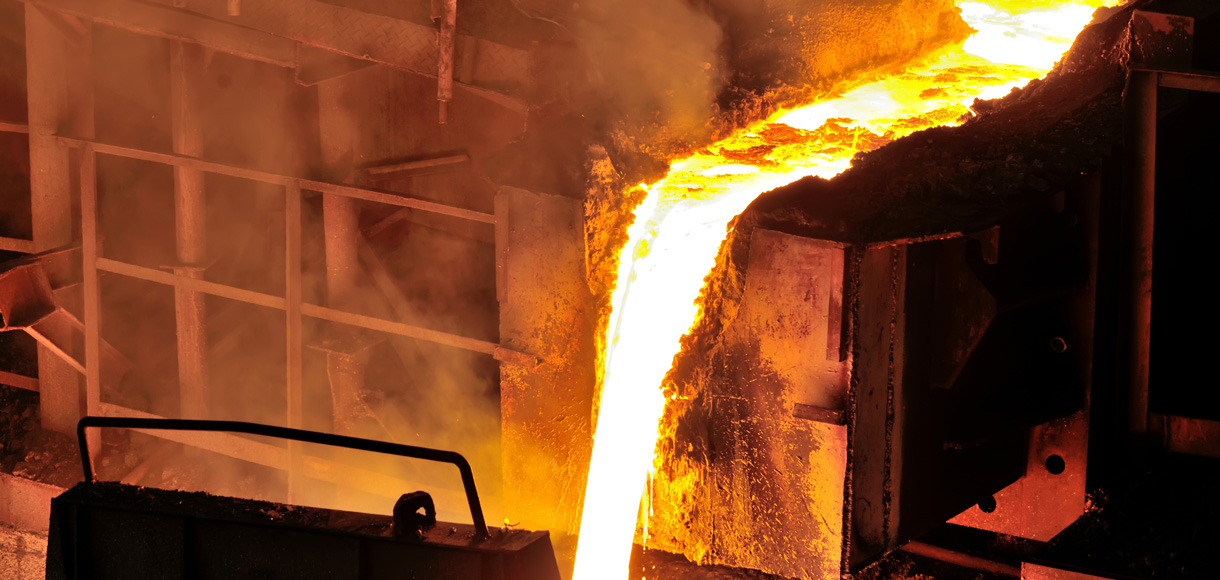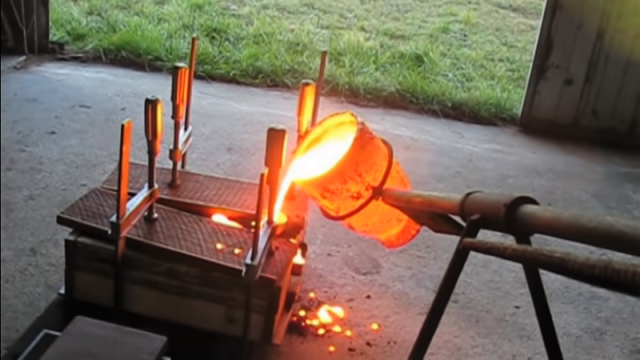What makes a Metal Foundry indispensable in the manufacturing industry
Wiki Article
A Deep Dive Into Steel Foundries: Trick Providers and Their Effect on Manufacturing
Metal foundries are important to modern-day manufacturing, using vital solutions that shape the manufacturing landscape. They specialize in numerous casting processes, guaranteeing accuracy and top quality in steel elements. The evolution of innovation and lasting techniques has even more influenced their procedures. As sectors significantly count on these foundries, understanding their crucial services and the ramifications for production performance ends up being vital. What challenges and technologies lie in advance for this important market?Understanding Metal Casting Processes
Metal casting processes transform liquid metal into strong objects with various methods, each tailored to details applications and products. Among the most usual approaches are sand casting, investment spreading, and pass away spreading, each offering unique benefits. Sand spreading uses a mold and mildew constructed from sand, enabling the production of large parts at a fairly low cost. Financial investment casting, on the various other hand, involves producing a wax pattern that is covered in ceramic, yielding complex and highly detailed forms. Pass away casting employs high stress to require molten steel right into a mold and mildew, which is ideal for automation of tiny, accurate components. These processes permit for a variety of metals to be made use of, consisting of bronze, light weight aluminum, and steel, suiting diverse industrial needs. The choice of an ideal spreading technique depends on elements such as needed tolerances, production quantity, and material buildings, affecting the general effectiveness and performance of completion items.The Value of Precision Casting
Precision spreading plays an important role in producing components that require high accuracy and detailed details. This method, often described as investment casting, permits for limited resistances and complicated geometries, making it crucial in industries such as aerospace, auto, and medical gadgets. By using wax patterns that are coated with a ceramic shell, accuracy spreading allows the production of get rid of smooth surface areas and very little finishing demands.
Alloy Advancement and Product Selection
In the domain of metal shops, alloy development and product option are essential elements influencing the efficiency and durability of actors components. The selection of alloy straight affects mechanical properties, such as stamina, ductility, and corrosion resistance, essential for conference particular application requirements. Factories typically engage in extensive research study and testing to optimize alloy structures, customizing them to the distinct needs of different industries, consisting of automobile, aerospace, and building and construction.Product choice likewise includes evaluating variables like availability, manufacturability, and price, making sure that the selected alloy straightens with manufacturing abilities and budget constraints. Advanced simulation tools and logical methods are employed to anticipate the actions of various alloys under varying conditions, providing useful insights for engineers. Eventually, reliable alloy advancement and material selection allow foundries to produce top quality parts that boost operational effectiveness and reliability in their intended applications.
Cutting-edge Molding Methods
Transforming the manufacturing process, cutting-edge molding strategies play a critical function in enhancing the efficiency and quality of cast components in steel factories. Techniques such as 3D printing and vacuum molding have actually become game changers, enabling complex styles and lowered preparations. These methods make it possible for factories to create molds with intricate geometries that traditional strategies commonly struggle to attain.Additionally, using sophisticated materials for molds, such as composite resins, enhances toughness and decreases wear, causing longer manufacturing runs. Fast prototyping further permits for quick iterations, promoting faster growth cycles and making it possible for producers to react more swiftly to market needs.
In addition, automation in molding processes simplifies operations, minimizing human mistake and increasing throughput. By integrating these innovative methods, steel foundries can maximize their manufacturing capabilities, eventually causing greater quality spreadings and boosted total efficiency in the affordable production landscape.
Quality Control in Metal Foundries
Quality control in steel shops is necessary for making sure the integrity and efficiency of cast items. It encompasses numerous examination methods and standards, along with issue detection techniques to determine potential concerns early in the production procedure. Robust quality guarantee processes are essential for maintaining consistency and conference sector requirements.Inspection Techniques and Specifications
Guaranteeing the honesty of steel spreadings requires extensive examination strategies and adherence to established standards. Steel shops implement numerous assessment approaches to review the top quality of cast products, including visual inspections, dimensional checks, and non-destructive testing (NDT) These strategies help to determine potential flaws early in the manufacturing process. Criteria such as ASTM and ISO give guidelines for acceptable quality degrees and screening procedures, ensuring that foundries keep constant top quality throughout their production lines. Compliance with these requirements not only enhances item reliability however additionally promotes trust fund amongst customers. By focusing on assessment techniques, steel factories can minimize risks connected with flaws and assurance that their spreadings fulfill customer specifications and market needs.Defect Detection Approaches
Reliable issue detection methods are indispensable to preserving high standards in steel factories. These methods encompass a selection of methods targeted at recognizing imperfections in castings before they are refined further. Typical strategies include visual evaluation, which depends on the trained eye of assessors to identify surface area problems, and non-destructive screening (NDT) techniques such as ultrasonic testing and radiography, which expose inner problems without harming the product. Furthermore, automated systems employing artificial intelligence and fabricated intelligence are significantly used to analyze information and identify abnormalities. Each technique plays an important function in ensuring the honesty of the last item, lessening waste, and boosting general production performance. By executing robust defect discovery procedures, shops can copyright their reputation for quality.Quality Control Processes
In metal factories, a thorough quality control process is necessary for creating high-performing and trusted castings. This process incorporates various phases, consisting of raw material assessment, in-process tracking, and end product evaluation. By carrying out standardized treatments, shops can methodically determine and rectify problems prior to they escalate into pricey problems. Advanced methods, such as non-destructive screening and metallurgical analysis, are employed to evaluate the stability of castings. Additionally, paperwork and traceability are essential elements, ensuring that each action of production satisfies stringent quality criteria. Training personnel in quality assurance methods further enhances the efficiency of these procedures. Ultimately, a durable top quality assurance structure not just increases functional efficiency yet also enhances client trust and satisfaction in the factory's result.The Duty of Innovation in Shop Operations
Technology changes shop procedures by improving safety and security, performance, and precision. Automation plays a crucial duty, streamlining processes such as mold and mildew making and steel pouring, therefore lowering labor costs and decreasing human mistake. Advanced computer-aided design (CAD) software program makes it possible for accurate modeling of components, assisting in quicker modifications and versions during manufacturing.Additionally, the assimilation of robotics in tasks like material handling and completing processes enhances performance and assurances constant top quality (Aluminum Casting). Real-time tracking systems and data analytics offer useful understandings right into operational performance, enabling timely interventions and upkeep, which eventually extends devices life expectancy

The fostering of 3D printing modern technology better allows rapid prototyping and customized services, noticeably reducing lead times. In addition, advanced materials modern technology enhances the residential or commercial properties of alloys, boosting casting performance. To summarize, technical advancements are vital in enhancing shop procedures, making it possible for producers to satisfy the enhancing demands for quality and performance in the competitive steel industry.
Environmental Considerations in Steel Casting
Environmental factors to consider in steel casting play a considerable role in shaping sector methods. Effective waste monitoring, progressed emission control modern technologies, and making use of lasting products are necessary for minimizing the environmental impact of shops. Resolving these aspects is important for promoting a more lasting future in steel manufacturing.
Waste Monitoring Practices
Efficient waste management Metal Foundry methods are crucial in the metal spreading sector to alleviate ecological effects. Aluminum Foundry. Foundries create various kinds of waste, consisting of metal scrap, sand, and chemical residues. Applying recycling programs enables the repurposing of steel scrap, reducing the need for virgin products and reducing land fill payments. Additionally, foundries often make use of sand reclamation processes, which recycle and recoup sand numerous times, thereby decreasing waste generation. Appropriate disposal approaches for unsafe products, such as binding solvents and agents, are crucial to stop dirt and water contamination. Employee training on waste segregation and reduction techniques can enhance overall effectiveness and sustainability. Through these methods, steel factories can considerably minimize their eco-friendly footprint while preserving production performanceEmission Control Technologies
As the metal casting industry evolves, the application of sophisticated emission control technologies ends up being progressively important for lowering hazardous toxins released throughout manufacturing processes. These technologies encompass numerous approaches, consisting of electrostatic precipitators, scrubbers, and catalytic converters, which successfully record and counteract exhausts prior to they go into the atmosphere. By incorporating such systems, shops can substantially decrease particulate issue, unstable organic substances, and various other harmful emissions. In addition, conformity with stringent ecological guidelines not only alleviates ecological impact yet additionally improves the industry's reputation and operational effectiveness. The fostering of these innovations reflects a commitment to sustainable practices, making sure that metal casting operations can fulfill the expanding demand while focusing on environmental health and wellness and security.Lasting Materials Use
Sustainable materials usage in steel spreading plays an essential function in minimizing the sector's environmental impact. Foundries are progressively embracing recycled metals, which considerably decrease the demand for virgin sources and reduced energy usage during the production process. Additionally, using green binders and ingredients enhances the sustainability of casting operations by minimizing hazardous exhausts and waste. Advancements in material science likewise enable the growth of biodegradable choices that do not endanger item quality. Factories are carrying out life-cycle analyses to review the environmental influence of products throughout their life-span, advertising even more liable sourcing and use. On the whole, these techniques add to a much more eco aware and lasting steel spreading sector, aligning with global initiatives to minimize carbon footprints.Often Asked Concerns
What Are the Main Kind of Metal Used in Shops?
Foundries primarily use metals such as iron, copper, aluminum, and magnesium. These materials are chosen for their unique residential properties, which influence the spreading process and the efficiency attributes of the end products made.Exactly How Do Factories Make Sure Employee Security During Procedures?
Factories ensure employee safety and security with strenuous training, appropriate equipment, ventilation systems, and adherence to safety and security policies. Normal examinations, personal safety gear, and emergency situation protocols even more enhance a risk-free workplace for workers engaged in steel manufacturing.What Is the Normal Preparation for Casting Manufacturing?
The normal lead time for casting manufacturing differs, normally varying from a couple of weeks to a number of months. Elements influencing this timeline consist of complexity of the layout, material availability, and the foundry's manufacturing capacity and scheduling.Exactly How Do Foundries Handle Waste and Recycling Processes?
Factories handle waste and recycling by implementing processes such as steel improvement, sand recycling, and proper disposal of unsafe products, consequently minimizing environmental effect and advertising sustainability in their operations while sticking to regulative requirements.What Industries Many Generally Use Steel Shop Services?
Metal foundry solutions are largely used in sectors such as vehicle, aerospace, construction, and machinery manufacturing. These industries rely upon shops for creating cast steel parts necessary for numerous applications and item development.Steel factories are important to modern production, using crucial solutions that shape the manufacturing landscape. Steel casting processes change fluid steel into solid things with numerous strategies, each customized to particular applications and products. As technology breakthroughs, the value of accuracy casting continues to expand, driving advancement and performance in steel shop operations. Transforming the production process, innovative molding strategies play a pivotal role in enhancing the performance and high quality of cast components in metal shops. In metal shops, a complete top quality guarantee procedure is vital for creating reputable and high-performing spreadings.
Report this wiki page